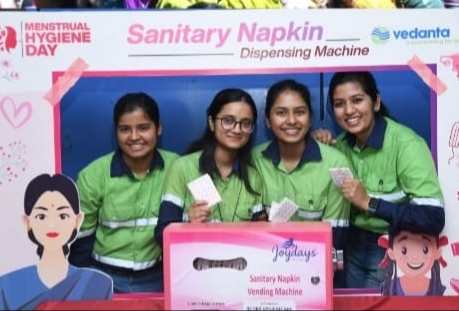New Delhi: Vedanta Aluminium, the largest aluminium producer in India, reached out to over 2300 women to raise awareness around women’s health as part of Menstrual Hygiene Week across its operations in Odisha and Chhattisgarh. Aligned to this year’s UN theme of ‘Making menstruation a normal fact of life by 2030’, the company launched a series of crucial initiatives in an effort to improve rural women’s health, including the establishment of a sanitary napkin production unit, the installation of sanitary napkin dispensing machines at its plant premises, and several awareness sessions on Menstrual Hygiene Management (MHM).
Vedanta Aluminium’s initiatives are in continuation of its longstanding commitment to promoting rural women’s health and well-being in the areas around its operations, towards helping them make informed, safer choices and dispelling myths. The company is also fostering transformative socio-economic impact through the local production and supply of affordable and eco-friendly feminine hygiene products from women-led microenterprises in the communities.
Sharing his views, Rahul Sharma, CEO, Vedanta Ltd – Aluminium Business said, “At Vedanta Aluminium, we consider the health and well-being of local communities and our employees as our utmost priority. Our initiatives during Menstrual Hygiene Week reflect our continued focus on enhancing the well-being of women in our communities, who, as the primary caregivers of children in rural areas, are crucial to ensuring the overall being of entire communities as well. By strengthening the healthcare ecosystem, raising awareness, challenging stigmas, and providing necessary resources, we aim to help women in making safer choices, while also enabling the socio-economic transformation of rural India.”
At the township at Vedanta Jharsuguda, one of the world’s largest single-location aluminium plants, the company organized several activities on women’s health and hygiene. The company announced its collaboration with Kalinga Institute of Industrial Technology (KIIT), Bhubaneswar to launch the ‘Saukhyam’ initiative. The collaboration will establish a state-of-the-art biodegradable sanitary napkin production unit, fostering livelihood opportunities and advocating hygienic practices and products for local girls and women. 100 sanitary dispensing machines have also been installed in the washrooms of the plant, providing 4000 biodegradable napkins every month for its employees. The enthused volunteers of Vedanta Aluminium performed a ‘Nukkad Natak’ that raised awareness about menstrual hygiene and dispelled misconceptions. Gynaecologists shared compelling information on Menstrual Hygiene Management (MHM) protocols and ran health check-up camps for the local women. Employee volunteers facilitated meaningful discussions with the community, emphasizing the advantages of sanitary napkins over cloth.
BALCO, India’s iconic aluminium producer at Korba, Chhattisgarh and a subsidiary of Vedanta Aluminium, installed more than 30 sanitary napkins dispensing machines in female washrooms at the plant on this occasion. In a powerful campaign to transform prevailing misconceptions surrounding menstrual health, the company conducted the “Safe Spaces Campaign” which sensitized hospitals/clinics and local shopkeepers on menstrual health, to foster a supportive environment through oath-taking and pledge letters. The engaging “Saas Bahu – Maa Beti Sammelan” introduced fun activities like Period Ludo to educate women on feminine health & hygiene. Activities like “Menstrual Hygiene Management Rally & Wall Painting” raised awareness through spirited rallies and colourful murals. “Ratri Chaupal- Chale gaon ki Aur” offered infotainment evenings with the screening of topical films such as Sarika- Dondro Ki Nayi Kiran to spark discussions around prioritising women’s health. Additionally, expert health talks delved into menstrual and mental well-being, complemented by creative activities.
Vedanta Aluminium’s world-class alumina refinery in Lanjigarh, Kalahandi district Odisha, launched a new project on Menstrual Hygiene called ‘Pehli Udaan’, focused on menstrual health education for adolescent girls. The company hosted Ms. Payal Patel, popularly known as ‘Pad Woman of Odisha’ for the launch of the project. She has, notably, worked towards raising awareness on feminine hygiene, setting up a sanitary pad manufacturing unit using biodegradable products and making reusable napkins available to rural women. The initiative will sensitize community women about menstrual health and provide them access to affordable products, ensuring hygienic menstrual practices. The project will also offer training sessions on reusable sanitary napkin making, providing support and opportunities for growth to local women through Self-Help Groups (SHGs).
Vedanta Aluminium raises menstrual hygiene awareness among rural women







